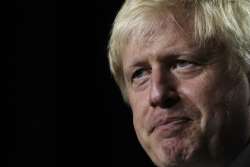Brexit: UK PM Boris Johnson loses parliamentary majority amid no-deal showdown
Brexit deal row seems to have shaken yet another government in the United Kingdom as Prime Minister Boris Johnson lost working majority in the House of Commons in UK Parliament. MP Phillip Lee of the Conservative Party (led by Boris Johnson) defected to Liberal Democratic Party on Tuesday.

Brexit deal seems to have shaken yet another government in the United Kingdom as Prime Minister Boris Johnson lost working majority in the House of Commons in UK Parliament. MP Phillip Lee of the Conservative Party (led by Boris Johnson) defected to Liberal Democratic Party on Tuesday.
Boris Johnson favours a no-deal Brexit, that is, exit from the European Union without striking an agreement with the bloc. A no-deal Brexit may set-off the collapse of UK's economy, some experts believe.
Johnson is thus facing a tough opposition over his no-deal plans even from within his own party.
Jolt to Boris Johnson has come at a time when UK lawmakers have turned to a key piece of legislation on their agenda that would prevent an immediate no-deal Brexit.
If it passes this week, Johnson's Downing Street office said he'll call an early election — taking his argument directly to the people.
On a day of high drama and acerbic debate in the House of Commons, lawmakers returned from their summer recess to confront Johnson over his insistence that the U.K. leave the European Union on Oct. 31, even without a withdrawal agreement to cushion the economic blow. Many shouted, "Resign!"
"Enough is enough," Johnson said. "The country wants this done and they want the referendum respected. We are negotiating a deal and I am confident of getting a deal."
Johnson's tenuous position became clear even as spoke in Parliament for the first time since it reconvened. Lawmaker Phillip Lee rose from his chair on the Conservative benches and sat down with the Liberal Democrats, a defection that meant Johnson lost his slim working majority.
That makes Johnson vulnerable should lawmakers opt to try to oust him in a vote of no confidence and will complicate passage of legislation.
Earlier Tuesday, two other prominent Conservatives signaled their intention not to seek re-election rather than bend to Johnson's will. Former Cabinet minister Justine Greening and former Foreign Office Minister Alistair Burt also signaled their intention to stand down.
Jeremy Corbyn, leader of the main opposition Labour Party, lambasted the weakened Johnson, accusing him of "riding roughshod" over the constitution in order to crash Britain out of the EU without a deal.
"He isn't winning friends in Europe. He's losing friends at home. His is a government with no mandate, no morals and, as of today, no majority," Corbyn said.
Johnson, who became prime minister in July, has tried to crack down on members of his Conservative Party who oppose his Brexit plans, warning they would be expelled from the party if they supported parliamentary efforts to block or delay the withdrawal.
Dominic Grieve, who was attorney general in David Cameron's government, says the expulsion threats demonstrate Johnson's "ruthlessness." Greening said she feared her beloved party was "morphing into Nigel Farage's Brexit Party." Former Treasury chief Philip Hammond warned of the "fight of a lifetime" if officials tried to prevent him from running in the next election.
All three oppose Johnson, with Hammond saying he expected a procedural motion to take control of business. If it passed, a vote to block a no-deal would be considered Wednesday.
Changing the government would not be so simple, however. A no-confidence vote would spark a 14-day period in which Johnson could try to overturn the result. If he failed, there would be a general election.
During that key 14-day period, another lawmaker could try to win Parliament's backing in a vote. If they succeeded, Johnson should, in theory, have to step down and let the winner form a government.
But these rules were introduced in a 2011 law and have never been tested.
As Brexit faces crucial days, international investors are showing concern. The pound sterling fell as low as $1.1960 on Tuesday, down about a cent on the day before, stabilizing around $1.1990.
Also Read | UK launches 'get ready for Brexit' campaign
Also Read | UK lawmakers angry as PM Johnson moves to suspend parliament ahead of Brexit, wins Queen's approval